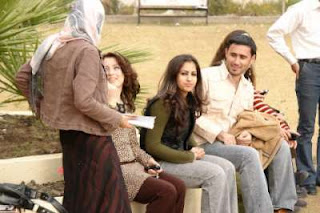Healthcare with no Limits
Bekhal was fading fast. The 25-year old woman, trapped in her native Kurdistan in northern Iraq, had unknowingly taken counterfeit medications, given to her by doctors, and as a result the Leukemia in her bones continued to spread. Standing frailly in a doorway of her family home, Bekhal listened as her father told me about the investigation into the phony drugs. Now, only days after being given the medication in a government hospital, doctors informed Bekhal that recovery within Kurdistan was impossible. Facing few options, the father outlined his plan to sell his modest house to travel with Bekhal to India in search of a last chance to save his only daughter.
When I returned to my native Kurdistan to administer heath aid to refugees, I
encountered countless individuals like Bekhal who were suffering
unnecessarily because of a lack of government quality control and drug safety.
In Kurdistan, years of war, oppression and sanctions imposed on the region
played a role in adding to her illness.
This pattern that is unfortunately seen around the world. Countries that
experience prolonged periods of armed conflict struggle to maintain hospitals,
schools and colleges. This impacts educational standards and leads to a
disastrous “brain drain,” as intellectuals and health care providers flee the
country, leaving few to provide suitable health care.
In the early 1990s during the Iraq-Kuwait War, after the U.S. government pulled American military forces out of the region, the former Iraqi regime planted mines around Kurdish cities. Over the following decade, thousands of Kurdish children became innocent victims of the mines, either killed or disfigured. The world noticed the plight of these children, and non-governmental agencies --with a generous funding from the United Nation—returned to Kurdistan to disarm the mines. The project also created a number of employment opportunities people like my brother who spoke English.
By helping to disarm the mines, my brother and our family became targets of the regime. Once the project was over, our only hope for survival was to leave Iraq and seek shelter as refugee in the United States. We were at first denied, but after regime threats made the danger clear our family was granted asylum status. We were all placed in buses at the Iraqi-Turkish border and left the country September of 1996.
We landed in the U.S. in November of 1996 when I was 12 years old. Culture, language and environment were all new to my family and I. The United States, we had always heard, is the land of opportunities where hard work pays off. I knew I had to master the English language and apply myself without reservation. With much diligence and support from my family, I graduated with bachelors, masters and doctoral degrees. At that moment, at the forefront of my mind were the refugees in Northern Iraq who needed help.
After I graduated from pharmacy school, having acquired the necessary training, I returned to the land where I was born to provide first aid care to refugees from minority groups that escaped ISIS to find refuge in Northern Iraq. As a Kurdish American, I felt a deep sense of obligation to help and serve others regardless of their background. For three years, we administered aid until it became too dangerous and we were ordered to return to America.
As shown in the case of Bekhal, Kurdistan lacks the proper regulatory
systems and is struggling to control an influx of imported counterfeit drugs.
As a result, pharmacies routinely sell medications without a proper
prescription from a medical doctor. Many pharmacies fail to employ a
certified pharmacist to properly counsel patient customers on the correct
intake and use of medication. Countless pharmacies handle and store medications
under unsafe unhygienic conditions.
Pervasive problems also exist in direct patient care. Research shows that a
medical doctor on average spends a mere 30 seconds speaking with each patient,
with the remaining time clinic devoted to looking up patient data in the
computer and communicating findings with the nurse. Is 30 seconds sufficient
enough to address every concern a patient might present to the healthcare
provider with?
The large number of patients like Bekhal that I encountered in the refugee camps kept me from giving my patients all the personal attention and care that they deserved as human beings. Maybe comprehensive healthcare is not what these patients needed when they stopped by my clinic. My experiences have taught me that making a small difference in someone’s health being can be as simple as giving them a smile, a simple gesture or even a hand touch. There were little girls in the camp who were victims of sexual assault as well as strict cultural roles who just wanted be that young American healthcare provider with a white coat providing care in Arabic or Kurdish language. They would stand outside my clinic door and just look until I would look back and walk toward them for a quick chat. I found that giving my attention to these girls and making a simple difference like teaching them how to blog or play sports was actually more rewarding to myself than it was to them.
Having once lived and later served in a region that still struggles with refugee crisis, I feel a real passion and appreciation for things I began to take for granted after my immigration to the U.S. To this day, the lessons I learned from the refugees continue to shape my outlook on preventive and medical care…




Comments
Post a Comment